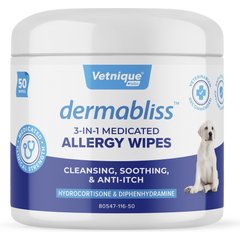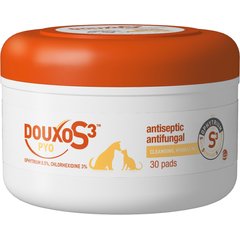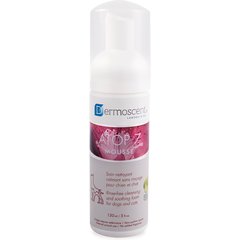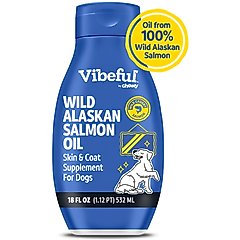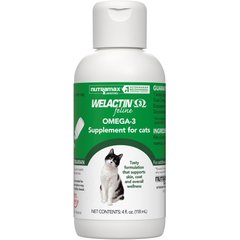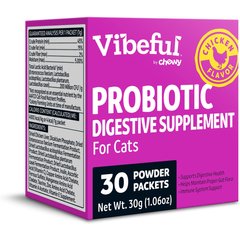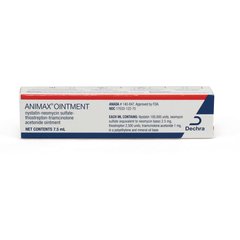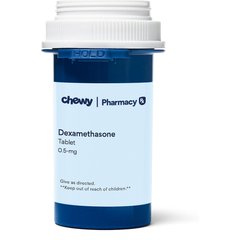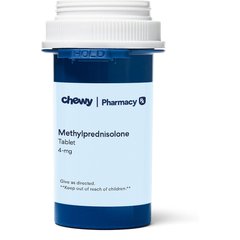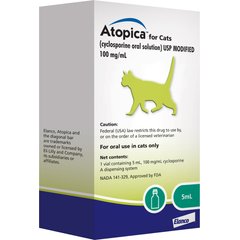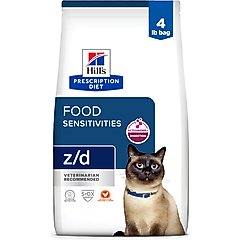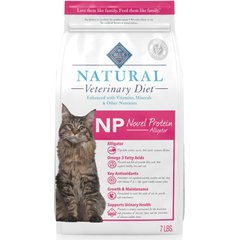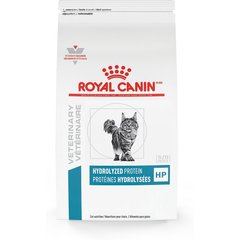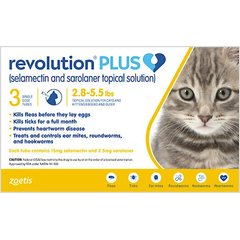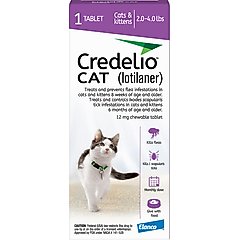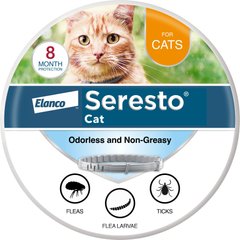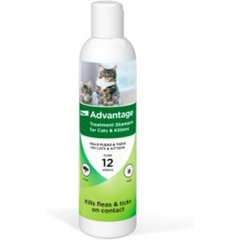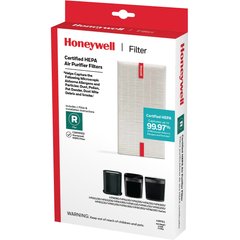What Can I Give My Cat for Allergies?
Photo by Chewy
This content was written and reviewed by veterinary professionals to answer your most common questions about this topic. This content shouldn’t take the place of advice by your vet. No vet writer or qualified reviewer has received any compensation from the manufacturer of any medication or product as part of creating this article.
Itchy skin, hair loss, ear and skin infections: Allergies in cats can manifest in many ways—none of which are particularly comfortable for your furry friend. Luckily, though, there are several options for allergy relief in cats.
Always work with your veterinarian if you have a cat with allergy symptoms to get to the bottom of the problem and solve it, if possible. Many other skin conditions such as mosquito bite sensitivity, bacterial skin infection, yeast skin infection, skin mites, autoimmune skin disease, and ringworm (fungal) infection have similar signs to skin allergies but require different treatments.
Talk to your veterinarian before starting any treatment for allergies.
Key Takeaways
- Cat allergies are common, often stemming from pollen, dust, mold, and food sensitivities.
- You can help reduce your cat’s symptoms through avoidance, regular cleaning, and using air purifiers and hypoallergenic bedding.
- Food allergies in cats often involve proteins like beef, fish, or chicken, and often present as skin or digestive issues.
- If you suspect your cat has allergies, see a vet to determine the underlying cause.
Chewy
3 Types of Allergies in Cats
While the true prevalence of allergies in cats is unknown, cat allergies are believed to affect anywhere from 10–15% of our feline friends. And the most common cat allergy? Flea allergy dermatitis, which is among one of three main skin allergies in cats.
Here are the different types of allergies in cats and treatment for each.
Always check with your vet before treating your cat for allergies and prior to giving them any over the counter (OTC) medication or supplement.
1. Flea Allergy Dermatitis (FAD)
Flea allergy dermatitis is the most common allergy in cats caused by an allergic reaction to flea saliva.
The classic signs of FAD in cats include:
- Itching
- Scratching around the head and neck
Hair loss and small crusty scabs around the base of the tail and around the head and neck is known as miliary dermatitis. You may or may not see fleas, but FAD can be so intense that it takes just the bite of one passing flea to make a cat miserable and pull their hair out!
FAD is treated with veterinary-approved flea preventives; topically applied wipes and shampoos; omega-3 fatty acids; and prescription treatments, such as:
- Steroid (cortisone) injection
- Prednisolone
- Apoquel
- Triamcinolone
- Betamethasone
2. Environmental Allergies
Environmental allergies such as seasonal allergies to pollens, dust mites, or mold are called atopy. Atopy is the second-most common itchy skin disease in cats.
Signs of atopy include:
- Itchiness around head and neck, belly, and legs (but cats may be itchy elsewhere; itching may or may not be seasonal, depending on the allergen)
- Recurrent ear infections and miliary dermatitis
- Secondary skin infections with yeast and bacteria
- Eosinophilic granuloma complex lesions
Usually first seen in cats ages 6 months to 2 years of age, atopy may be linked to asthma or chronic bronchitis in some allergic cats.
Seasonal allergies can be treated with:
- OTC allergy medications, like oral human antihistamines, topically applied wipes and mousses, omega-3 fatty acids, and probiotics
- Prescription medications, including topical treatments (like Animax) and oral treatments (like Atopica)
- Allergy shots (allergen-specific immunotherapy or ASIT)
3. Food Allergies
Food allergy is the third-most common itchy skin disease in cats, and purebreds such as Siamese cats are predisposed to this condition.
More accurately known as adverse food reactions, this is when the immune system of a cat’s digestive tract inappropriately overreacts to an ingredient in the food, usually a source of protein. Affected cats are usually fed the offending ingredient for two years before developing signs.
The most common allergens in cats are protein in nature and include:
Signs of food allergies in cats include:
- Non-seasonal itching and scratching of the head, neck, or in some cats, elsewhere on the body
- Hair loss
- Red skin
- Miliary dermatitis
- Ulcerated areas (eosinophilic granuloma complex)
- Scabs
- Digestive issues, such as vomiting, diarrhea, and gas
Cats who have a food allergy often have concurrent flea allergy dermatitis and/or atopy as well.
Food allergies can only be diagnosed by a food elimination trial, and treatment typically involves feeding your cat a hypoallergenic diet.
What Can I Give My Cat for Allergies?
Over-the-Counter Medications
If your cat has been diagnosed with FAD or seasonal allergies, over-the-counter allergy meds for cats, such as antihistamines, can help treat symptoms.
Always check with your vet before treating your cat for allergies and prior to giving them any over-the-counter (OTC) medication or supplement.
Antihistamines
Antihistamines block histamine, a substance your body produces in reaction to allergens, and can help treat allergy symptoms. Antihistamines alone sometimes help cats with mild itching, but they are more commonly given in combination with other treatments.
Antihistamines in cats can cause sleepiness, like in humans, but can also cause some cats to become hyper or, rarely, have urinary retention, so it is not safe for all kitties.
At the time of this publication, studies have not shown any particular antihistamine to be best for use in cats, so it may be necessary to work with your vet to try different ones to find one that provides some relief.
Some common antihistamines for cats that your vet may recommend include cetirizine (Zyrtec), diphenhydramine (Benadryl), and chlorpheniramine.
Recommended Products
If an antihistamine does not help relieve your cat’s itching, your vet may recommend other treatments with proven effectiveness in cats.
Talk to your veterinarian before giving your cat any medication.
Topicals
Topical therapy, such as a wipe, mousse, or conditioner, can be a good way to help calm irritated skin in cats with FAD or seasonal allergies. They are also good options for cats who do not like water and baths.
Talk with your vet about waterless options, such as:
- You can wipe your cat with a pet wipe, like Vetnique Labs Dermabliss Medicated Hydrocortisone 3-In-1 Allergy Wipes, after they go outside and roll in the grass. If the skin is really irritated, an antiseptic, antifungal wipe (like Douxo) may provide even more support.
- Or you can try a calming mousse (like Dermoscent) on your feline friend’s itchy skin.
Talk to your veterinarian before giving your cat any medication.
Recommended Products
Supplements
Another treatment option your vet may pursue for cats with FAD or seasonal allergies are supplements, including probiotics and fish oil.
Omega-3 Fatty Acids (Fish Oil)
The omega-3 fatty acids that help cats with allergies are EPA and DHA.
Fish oil supplements, like Vibeful by Chewy Wild Alaskan Salmon Oil or Nutramax Welactin Omega-3 Fish Oil, may offer natural allergy relief for cats by helping reduce inflammation associated with skin allergies. They may also help skin cells maintain a strong barrier against allergens.
Recommended Products
You can give a cat too much fish oil, however, and fish oil is not indicated for all cats. Consult with your veterinarian on the use of fish oil and the appropriate dosage before giving fish oil to your cat.
Probiotics
Allergies are due to inflammation and an abnormally hyper-reactive immune system. The largest collection of immune cells is located throughout the digestive tract.
Unhealthy or inflamed intestines with abnormal gut bacteria can contribute to allergies, which is why supplementing an allergic cat with probiotics (healthy bacteria) may help reduce inflammation in the body and help rebalance their gut immune system.
Do not supplement cats with human probiotics—human gut bacteria are different from feline. If your vet recommends a probiotic for your cat, use a feline-specific product, like Vibeful by Chewy Probiotic Gastrointestinal Support Powder Digestive Supplement.
Talk to your veterinarian before giving your cat any supplement medication.
Recommended Product
Prescription Medications
Sometimes, supplements and OTC products for cat allergies are not enough, and cat parents need prescription medication from the veterinarian to stop the itch. Often, cats benefit from a combination of both.
Prescription medicine can include:
- Prescription topical treatments
- Prescription oral treatments
- Allergy shots
Always make sure you tell the vet what supplements, products, and medications you are currently giving your cat, as they can potentially interact with prescription meds.
Prescription Topical Treatments
For cats with itchy, infected skin, Animax Ointment—a prescription topical treatment that combines a corticosteroid, an antifungal, and an antibiotic—may help.
Other topical steroid sprays or lotions may also be prescribed.
Recommended Product
Prescription Oral Treatments
Glucocorticoids
Glucocorticoids, or steroids, typically relieve the itch of atopic dermatitis quickly and effectively but may lose efficacy over time. The goal is to use the smallest amount possible to provide relief in the shortest period of time.
They come in many forms, including oral tablets and liquids as well as injections, and may include dexamethasone, Medrol, and more.
Recommended Products
These medications can have undesirable side effects, including:
- Increased appetite
- Increased drinking and urinating
- Elevated liver enzymes
When using glucocorticoids for allergies, your vet will likely try to wean your pet to the lowest possible dose that controls their clinical signs.
Atopica
Atopica is the brand name for cyclosporine, a medicine for cats with allergies. It inhibits inflammation without the use of steroids to provide relief. More info to note about this medication includes:
- It is an FDA-approved liquid prescription used for itching and inflammation related to feline allergic dermatitis.
- It can be squirted directly into the cat’s mouth after feeding.
- Most veterinarians will require annual blood work and an exam to fill this prescription.
- It takes a minimum of four to six weeks to provide relief, and other medications may be prescribed to your cat in the interim to control allergy symptoms.
Recommended Product
Prescription medications for treating the itch and inflammation associated with allergies in cats include:
- Triamcinolone
- Betamethasone
Immunotherapy (Allergy Shots/Oral Liquid)
If your cat cannot tolerate oral medications or you do not want to give oral medications over a long period of time, you may want to talk to your veterinarian about giving allergy injections, commonly known as allergy shots, or ASIT (allergen-specific immunotherapy), for cats.
Allergy shots typically require owners to take their pet to a veterinary dermatologist for allergy testing. The dermatologist will perform a skin prick test, like in human allergy testing, to determine what your cat is allergic to.
Once the test is done, an allergy serum is created based on your cat’s results. This allergy serum is usually administered via a series of injections and is intended to desensitize your cat over time to the specific allergens that trigger their allergy symptoms. On average, most cats receive their allergy injections every one to two weeks for the remainder of their life.
Improvement in symptoms can take six months to one year, and other therapies are used to control symptoms in the meantime.
Allergy shots are the only way to truly reduce the instances of allergy symptoms. All other cat allergy medicine is aimed at controlling symptoms.
For cats who need immunotherapy but do not tolerate injections, allergy serum can be formulated into a liquid given by mouth (sublingual), typically twice daily. Like allergy shots, sublingual immunotherapy is expected to be continued for life.
Hypoallergenic Diet
If your veterinarian has recommended a diet trial, it’s important to follow their food recommendations precisely.
Over-the-counter foods are not considered good hypoallergenic choices for food trials because they are often manufactured on machines that make other foods. Hypoallergenic foods generally are created on dedicated machines that are meticulously cleaned to prevent cross-contamination with allergens (this is also one reason why these diets cost more).
There are two main types of food to choose for diet trials:
- Hydrolyzed foods, which are foods that are manufactured to remove allergens
- Novel protein foods, where you feed your cat a protein and carbohydrate that they have never eaten before
Popular cat food for cats with allergies that are used by veterinarians for diet trials could include the below. Note that these foods are veterinary diet foods and, therefore, require authorization from your veterinarian.
Recommended Products
Flea and Tick Medication
Prevention is key, and consistent flea and tick treatment will help protect your cat from fleas, ticks, and parasites.
Fortunately, there are plenty of high-quality cat flea and tick treatments available, including:
- Topical treatments (like Revolution Plus, Advantage Multi, and Bravecto)
- Oral treatments (like Credelio)
- Flea and tick collars (like Seresto)
- Flea and tick shampoos (like Advantage Shampoo)
- Flea and tick sprays (like Advantage Spray)
Recommended Products
Treat the Environment To Reduce Allergens
If you have a cat with allergies, then you also need to think about treating the environment your cat lives in, especially if your cat suffers from flea allergies or atopy.
Flea Control
Use flea control consistently on all pets in the household throughout the year to keep flea allergies under control.
Be sure you use a flea and tick treatment formulated specifically for each type of pet according to their correct age and weight. In other words, don’t give your cat a flea and tick treatment formulated for dogs, and vice versa.
If your cat already has fleas, learn how to get rid of fleas on cats.
Reduce Exposure to Allergens
If your cat has atopy, then you need to reduce exposure to allergens.
Here are some ways to potentially reduce exposure to allergens:
- Check your HVAC filter monthly and change or clean as needed
- Plug in some air purifiers
- Cover bedding with an allergen barrier
- Wash pet bedding once a week during allergy season with a gentle, hypoallergenic laundry detergent
Recommended Products
FAQs About Cat Allergy Medicine
Q: Is Zyrtec or Benadryl better for cat allergies?
A: Either Zyrtec or Benadryl might help your kitty, but whether one or both work or don’t work depends on your cat. A 2013 study completed with 19 cats showed little relief from allergies using a specific antihistamine. However, that doesn’t rule out whether it might work for other cats.
You can work with your vet to try Zyrtec, Benadryl, or another antihistamine that helps your cat, but your cat may need other more effective treatments, like prescription medication, injections, omega fatty acid supplements, or topical therapies.
Q: How much Zyrtec do I give my cat?
A: Never give OTC human medication to your cat unless directed to do so by your veterinarian. If your cat is itchy or showing signs of allergies, please reach out to your vet to discuss the right medication for your pet.
Q: Can you give cats Benadryl?
A: Most cats can tolerate diphenhydramine, which is the active ingredient in Benadryl. Always check with your vet before giving your cat Benadryl, and ask your vet what dose is appropriate for your cat.
Q: What are the side effects of cat allergy medication?
A: Side effects of antihistamines include excessive tiredness, hyperactivity, urinary retention, vomiting, diarrhea, and seizures in sensitive animals.
Side effects of cyclosporine include nausea, vomiting, diarrhea, and gingival hyperplasia.
Side effects of steroids include increased drinking and urinating, as well as increased appetite.
Attributions
This content was medically reviewed by Molly Price, DVM, Chewy veterinarian.
